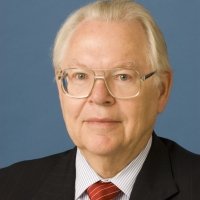Perspectives on the 30th Anniversary of 1991 and the Collapse of the Soviet Union
When the Soviet flag was lowered from the Kremlin for the last time on December 26, 1991, it signaled the final end of a collapse that was months, if not years, in the making. From the toppling of the Berlin Wall to the Ukrainian referendum on independence on December 1, 1991, the Soviet Union gave way to newly independent states from Central Europe to Central Asia.
What was it like for the participants at this historic turning point? This Kennan Institute panel convened the Russian Federation’s first Minister of Foreign Affairs, Andrei Kozyrev; the American chargé d'affaires at the U.S. embassy in Moscow at the time, James Collins; and Diana Negroponte, author of Master Negotiator: The Role of James A. Baker, III at the End of the Cold War.
Key Takeaways
- The dissolution still continues to have aftershocks politically and economically, but it’s not the tragedy that it’s often portrayed as by Vladimir Putin.
- When the communist party dissolved, there was more motivation from citizens to take the government seriously.
- Outside of Moscow, the end of the empire was viewed as ultimately positive due to the growth and development experienced by the newly independent states.
Selected Quotes
Diana Villiers Negroponte
“I think we have to start thinking about this. In the early summer of 1989, when the Polish people were allowed to vote for their senate, now this was only a hundred seats, but the labor union, the famous solidarity Solidarność, was allowed to run as a political party, and it won 99 of those 100 seats. This was a message to the whole of Eastern Europe, Moscow will tolerate democratic elections, Moscow does not send in the troops, and both in Poland and Hungary and Czechoslovakia and Romania, the message went through, let’s test it.
So we had the famous picnic in the summer of 1982 at nine when the Hungarians broke through the barbed wire fence and ran into Austria, and Moscow did not respond, and the world saw too they did not respond. We all know about November’s fall of the Berlin Wall, and Gorbachev talked with a colleague of all of us, Ambassador Ischinger, who went to Moscow two days after the fall of that wall, and Gorbachev turned to those West Germans and said ‘Don’t worry, after they have tasted the bananas and the sex shops of West Berlin they will all come home.’ Well they didn’t.
In the next few days we know that East Germans flocked into the West because they knew that that system which they have lived under for 40 years was crumbling, and still the Warsaw Pact troops stayed in barracks and they did not move. So there was a time of great uncertainty when Ambassador Collins went to Moscow in that summer of 1990. He was uncertain too. Would the Apparatchiks and the Kremlin pull down Gorbachev and reassert the power and the political and military forces of the Soviet Union, or, would they allow it to disintegrate peacefully? So I take it now to Baker and President Bush’s thoughtfulness in May of 1990, when the people of Lithuania on May 1 decided to assert their independence to declare independence, and the military in the Soviet Union did not approve of this, and they knew the consequences for the three Baltic states. If Lithuania went independent so too Estonia and Latvia. So this was a moment of danger, not only for Gorbachev and the government, but also for Bush and his team in the White House because they were counting on the stability of Gorbachev’s management of the Soviet government, and if that stability was wrecked, what might happen. Would there be a turn towards facism, or would there be a disintegration on the style and scale of the federation of Yugoslavia?”
James Collins
“I thought there was a wonderful sort of naivete frankly on the part of Americans, coming to Russia or looking at Russia, or talking to Russians about how they should do things in that extraordinary era of 1991-1992, where you know somehow you were supposed to have everything divided up equally and everybody would be an equal citizen with equal wealth and so. Well give me a break.
You know this doesn’t exist anywhere in the world, so the idea that somehow all of the Soviet wheel, let’s say, in the Russian Federation was going to be divided up equally among all the citizens was kind of a naive idea from the beginning. The question of how it got carved up and how it was done certainly could have been done more equitably, more, or in more orderly ways with greater respect for procedures that were fair, but it’s also true that in many ways the idea that oligarchs simply grabbed things was not quite the case, I mean what they did was for instance in the famous loans for shares issue, just as an example, the problem was the government was broke, the government was not collecting taxes, Andrei [Kozyrev] will know this, I mean they couldn’t.
I remember Mr. [Anatoly] Chubais at one point telling me he had two weeks of salaries left in the treasury. Well what does a government when it's broke do? It borrows money. And who had money to borrow? Well the oligarchs, the banks, and so forth had the money, and what they got as security was things like oil fields, and timber resources, and big factories and so forth. The government couldn’t pay the loans back, when they auctioned off something like an oil field, the problem was that the people who could afford to take the risk of bidding on it were largely Russians. Exxon was not going to bid on an oil field that didn’t have any known boundaries, there was no cadastral survey, they didn’t know what was in them, and they didn’t even have a sure understanding of who owned it. So the question of, you know, how much are you willing to pay for an oil field like that, well it wasn’t a lot. On the other hand, the Russian oligarchs knew, they knew how to manipulate the system. They could bid it for the money and get acquired. So there were a lot of ways in which oligarchs amassed their money that were particularly attractive. On the other hand, the system itself was almost impossibly structured at the time, and the government was so weak, that the idea that you could make it a fair and equitable process was frankly just not very realistic.”
Andrei Kozyrev
“There is future for Russia, and if ever the American government wanted to hear my advice, which hasn’t happened so far, I will tell them not to give up on Russia, especially because of this reason: there will be probably new Russia coming, with a new generation hopefully.
Secondly, my advice would be to understand clearly that so far right now, the other Russia is being judged, and it will go on against the United States, against the West, against Ukraine because Ukraine tries to join the West, as far as they can get away with. And talk, however, sophisticated, however diplomatically justified because diplomats try to believe that talking is always better than not which I doubt. That talk will never be well understood by the other side. They respect the deeds, especially force, because they use force by themselves. Including intimidation and deception and so they are naturally inclined to believe in those instruments from the other side. So that would be my advice. Double-edged. One is be hopeful for the good Russia but be very wary and prepared to act against a second Russia."
Speakers

Former Foreign Minister of Russia, 1991-1996


Moderator

President and CEO, US Russia Foundation
Hosted By

Kennan Institute
After more than 50 years as a vital part of the Wilson Center legacy, the Kennan Institute has become an independent think tank. You can find the current website for the Kennan Institute at kennaninstitute.org. Please look for future announcements about partnership activities between the Wilson Center and the Kennan Institute at Wilson Center Press Room. The Kennan Institute is the premier US center for advanced research on Eurasia and the oldest and largest regional program at the Woodrow Wilson International Center for Scholars. The Kennan Institute is committed to improving American understanding of Russia, Ukraine, Central Asia, the South Caucasus, and the surrounding region through research and exchange. Read more


